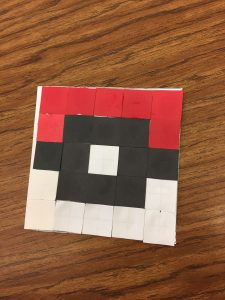I love my kids, a lot.
One of the best parts of being on a semester schedule, and ending my school year before my son ends his, is the flexibility that summer provides. Having flexible time means I can do the volunteering that I wasn’t able to do as much of this past school year. So when they needed parents to help with “Colonial Day” for the 5th graders, I signed up to help.
I mentioned this briefly on Facebook and had to explain to some of my friends what Colonial Day is. Others of them were shocked that Colonial Day still existed (They live in the Bay Area. There is no Colonial Day there). Colonial Day is a day in which students (usually 5th graders) proceed through various stations reenacting games, activities, and crafts from the early European settlement movement of the 17th century. The re-enactment of the early settlement activities such as creating corn husk dolls, quilted squares, and clay beads was actually pretty fun. It was good to see kids have the opportunity to engage in learning that was hands-on, not standardized and helped them to engage with the curriculum in a creative way. I loved his Pokéball quilt square and the fact that he made the parts for a fidget spinner in his clay beading class.
I know my son learned about the importance of colonial America to the establishment of our rights to religious freedom in this country. I don’t know how much my son learned about the oppressive side of colonial America, about the encounters, massacre and resistance of Native Americans, about the experiences of African slaves and the root of racial othering that many believe began in Colonial America, about quilting as a sign of economic prosperity in Colonial America. According to him, he learned that the Native Americans “were killed pretty badly” but that’s about it.
These historical lessons are important, but I saw traces of this inequality again today. My son is in a GATE (Gifted and Talented Education) program. His teacher is amazing. We’re given the option to buy yoga balls in the Fall to replace their normal chairs and help our students to focus in class. The room is full of a huge classroom library with diverse books, ranging in grade level from 4th-10th (at least). Her class is straight out of a Pinterest board and embodies everything I teach about in my preservice classrooms. At least 75% of the parents volunteering today for Colonial day were from the GATE class.
When 5th graders from other classes came in to the room, they were immediately drawn to the yoga balls and given the stern exhortation, “If you bounce on them, they’ll be taken away and you’ll get a regular chair.” But the kids were great and didn’t bounce on them excessively at all. One student said, “I wonder if the kids get to take them home at the end of the year and keep them.” When I explained to him that parents bought the yoga balls for their kids to sit on, he said, “That’s so cool. I wish I could have that.” Another group of students looked, from their seats, at the bookshelf saying, “Wow, there are some really big books here. In our classroom, there are only tiny books, like little kid books and stuff.” Another young person came in with his glasses broken. When he was asked by the teacher if this had just happened today and if he ordered replacements, he just shook his head. My heart broke in this moment.
My son’s classroom is exceptional, but I knew what the other kids meant. As I walked through some of the other classrooms, with teachers who I’m sure are incredibly dedicated (in fact, I saw some great use of visual & academic vocabulary for EL support in another classroom), I could see the inequity visually. Many of the room walls were somewhat bare and all of them had traditional chairs.
I’m still thinking a lot about today. For my son, we’ll use our drives to school and time at home to engage in conversations so he gets a better perspective on resistance and inequity in historical and current inequities and recognizes his own privilege in many ways. But, I wonder how to help shape these discourses in more meaningful ways in my life for children other than my own. It’s a struggle that I know will go on far beyond Colonial Day.

